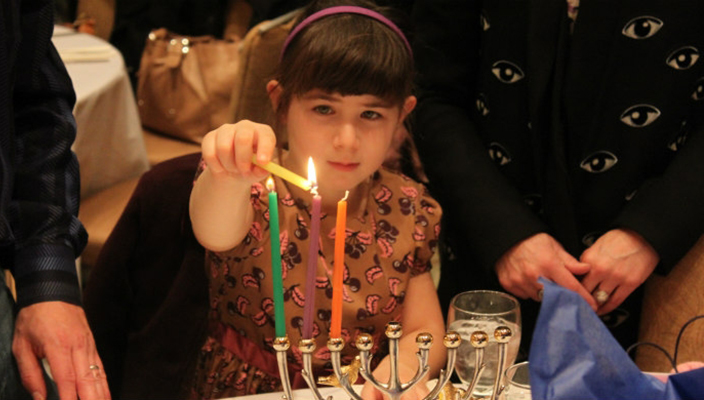
“Should we have a Christmas tree?”
“How should we decorate our home?”
“What wrapping paper should we use?”
“How can we give gifts to each other, to our families, and help people in need?”
“How do we express our choices to our extended family?”
There are no right answers to these questions; answers will vary from family to family and from year to year. How can you create a meaningful, memorable and joyous holiday season in a household where one partner is Jewish and one is not, or both were raised with different traditions? How can you create an honest dialogue that allows you both to share your feelings and work together to create your own family traditions?
These five suggestions can guide your conversations so you can approach the holidays with intention and gratitude.
1. Ask and share.
The holidays can elicit deep emotions connected to your families of origin and strong feelings of what you want. When you and your partner ask gentle, open-ended questions and truly listen to each other’s answers, you can express your emotions and clarify your needs. Sharing with each other in this non-judgmental way allows you to feel heard and respected.
What was Christmas or Hanukkah like for you growing up? What did it feel like to celebrate the holiday with your family and community? What people and rituals made the holiday meaningful for you? Remember that symbols can have different meanings and evoke strong feelings without being right or wrong.
Enjoy this process of learning more about each other, and view this as the first step of creating your family’s own set of traditions!
2. Understand each other’s needs.
Once you understand where you’re each coming from, you can start to establish traditions for your family. What do each of you need to feel that the holidays have meaning? What values and memories are important to you? How can they be reflected in your celebration? What messages about your religion do you want to emphasize? Allow space and time to honor the emotional pieces connected to each holiday for each of you.
How can you honor your extended family’s traditions while creating your own? If making Christmas cookies with your grandmother is a poignant memory, you can make the same cookies, or make your own Christmas and Hanukkah cookies to deliver to people in need. You can help extended family celebrate Christmas in their home and show how much you respect, love and appreciate their celebration without compromising your own choices.
When you’re clear about your own answers, it is easier to convey clear messages to your children and extended family.
3. Make choices for today.
What you do this year does not have to be what you do every year. Experiment, see how it feels, reflect, and then decide if you want to do it again. When you put pressure on yourself to decide whether or not to pass down a family tradition to the next generation, you may be forcing yourself to make decisions that might not really be right for your family.
As your family grows and changes, you will have different needs and can make different decisions each year as long as you have a respectful dialogue and can arrive at decisions that meet your changing needs.
4. Be intentional.
You and your spouse will feel successful entering the season if you have had these conversations and your decisions are intentional. In your conversations, read about Hanukkah and Christmas and find ways to celebrate that are appropriate for your children. You can also talk with family and friends to get other ideas.
Make decisions that meet each of your needs. When you’re ready to share your decisions with extended family, do so with the sensitivity that they might miss celebrating with you the way they want. Remember that each person in your extended family has their own needs and you can honor their traditions while staying true to yours. Share your reasoning, if they are open to listening, and honor them by listening to what they enjoy about their holidays.
5. Appreciate, love, and laugh.
Fill your conversations with appreciation and open hearts. It can be difficult for one spouse to enter December without a Christmas tree if you have decided to raise your family without one, while a Jewish spouse might feel hesitant to have a Christmas tree. Acknowledge each other's needs as you change rituals. Remember that there will be unanticipated situations: if you can laugh through those moments and realize that you don’t have to have it all figured out perfectly, you will both emerge stronger!
Both Hanukkah and Christmas celebrate light in the midst of darkness. May your holidays be filled with the light that comes with understanding and honoring each other, creating new traditions, and celebrating with family and friends!